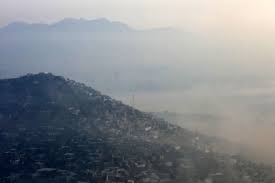Kabul faces severe air pollution, ranking among the top 10 most polluted cities globally. Air quality readings show an AQI above 100, posing significant health risks to residents.
Experts cite vehicle emissions, industrial activity, and seasonal weather patterns as major contributors to the city’s deteriorating air quality. Local authorities have urged citizens to take precautions, especially vulnerable groups such as children, the elderly, and those with respiratory conditions.
The pollution also disrupts daily life, affecting outdoor activities and increasing hospital visits due to respiratory and cardiovascular issues. Environmentalists warn that without urgent intervention, Kabul’s air quality may worsen in the coming months.
Authorities and NGOs are exploring measures such as cleaner fuels, stricter emission standards, and urban planning reforms to mitigate the crisis. Experts emphasize that improving public awareness and reducing pollution sources are essential for long-term solutions.
In conclusion, Kabul’s ranking among the world’s most polluted cities highlights the urgent need for action to protect public health and the environment.







